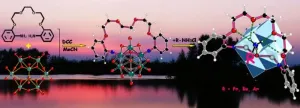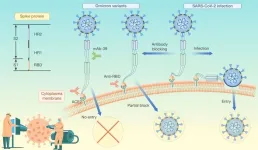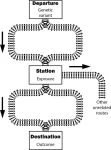(Press-News.org) Older drivers who have worse spatial orientation ability experience greater difficulty when making turns across oncoming traffic, according to new research from the University of East Anglia (UEA).
Spatial orientation skills are the combination of skills that enable us to mentally determine our position, or the position of our vehicle and other vehicles, relative to the environment.
Lead author Sol Morrissey, a PhD researcher at UEA’s Norwich Medical School, said: “Driving safety is typically reduced in older adults due to changes that take place during the ageing process, but little is known about how changes in the brain influence driving behaviour.
“This study shows that older adults with worse spatial orientation ability are less likely to drive frequently, and they report greater difficulty during driving.
“Importantly, we establish that having worse spatial orientation ability is associated with greater difficulty when making turns across oncoming traffic – which is a significant risk factor for fatal road traffic accidents.
“Driving safety assessments may therefore look to implement spatial orientation tests in the future.”
A total of 804 older adults were recruited between February 2021 and August 2021 to complete the study, with an average of 71.05 years.
Participants needed to be 65 or older, hold a current driving licence, and be a regular motorist, driving at least once per week.
Those recruited then completed online questionnaires related to their demographic information, health status, driving history, driving habits, road traffic incident history, spatial memory, and navigation ability.
Following this, participants completed a set of neuropsychological tests that assessed for cognitive performance across a variety of areas.
The results showed that driving behaviour difficulty and avoiding difficult situations is associated with worse spatial orientation ability within healthy ageing.
The study also replicated previous findings that processing speed is a key area affecting driving behaviour in ageing.
Spatial orientation has clear relevance to driving behaviour, as deficits will lead to increased difficulty in judging the position of the vehicle in relation to the surrounding environment. Furthermore, spatial orientation was the only cognitive domain demonstrating a significant effect on driving behaviour across the older age spectrum.
Older adults are overrepresented particularly in intersection crashes that involve multiple vehicles, and therefore orientation deficits are a key individual risk factor for road collisions involving turns across oncoming traffic.
Spatial orientation performance significantly predicted driving difficulty and frequency. Experiencing more driving difficulty was associated with worse spatial orientation, processing speed, and episodic memory performance.
Similarly, avoiding challenging driving situations was associated with worse spatial orientation and episodic memory.
Prof Michael Hornberger, of Norwich Medical School, said: “The research showed that deficits in spatial orientation are a robust indicator of driving performance in older age.
“This should be considered in future ageing driving assessments, as it has clear relevance for road safety within the ageing population.
“The proportion of older drivers on the road is projected to increase significantly in future years.
“Driving is of great importance in maintaining independence in older age, but it is also well established that age-related physiological changes and health conditions in older age increase the risk for driving collisions, and that these incidents are more likely to be fatal than for younger drivers.”
To date, research on the impact of ageing on driving performance has largely focused on physical and sensory function.
By contrast, cognitive changes, which are known to be critical for driving performance, have been much less explored in healthy ageing populations.
Most large-scale cognitive driving studies have only employed cognitive screening tests and even those in-depth studies have not considered how spatial orientation/navigation, a critical process for everyday mobility, impacts driving performance in ageing.
This latest research provides large-scale normative data of cognitive functioning within healthy older adults using online cognitive assessments.
Prof Hornberger added: “Online assessment batteries are particularly relevant for screening for changes in driving fitness over time, as they can be employed more conveniently, are more resource-efficient, and offer more precise measurements than in-person psychometric tests.”
The researchers also said the role of spatial orientation in predicting driving difficulty provides a potential explanation as to why road safety is reduced for motorists who have Mild Cognitive Impairment (MCI) and Alzheimer’s disease.
The researchers note some limitations to the study. Firstly, driving behaviours were self-reported by participants, and therefore may be subject to inaccuracy and/or bias.
Secondly, they were unable to investigate the environment in which participants typically drive, for example comparing rural and urban areas, and how these could have a significant impact on mobility requirements, type of driving, and cognitive functioning.
Future research may look to employ naturalistic driving measurements, such as via GPS location devices, to provide objective measures of driving behaviour and performance.
Further investigation should also be conducted into how driving behaviour changes relates to trajectories in cognitive functioning over time, which will provide key information as to how often fitness to drive assessments should be implemented and how both driving behaviour and cognitive assessments can be monitored.
The research was led by the University of East Anglia, in partnership with the University of Exeter, the University of Leeds, the Norfolk and Norwich University Hospitals NHS Foundation Trust and the MemCheck Memory Clinic at Chester Wellness Centre.
The study was funded by the UK Department for Transport and supported by the National Institute for Health and Care Research (NIHR) Applied Research Collaboration East of England (NIHR ARC EoE) at Cambridge and Peterborough NHS Foundation Trust.
The views expressed are those of the authors and not necessarily those of the NIHR or the Department of Health and Social Care (UK) or the Department for Transport.
Sol Morrissey’s studentship is jointly funded by the Faculty of Medicine & Health Sciences, University of East Anglia, and the Earle and Stuart Charitable Trust.
‘The impact of spatial orientation changes on driving behaviour in healthy ageing’ is published in the Journal of Gerontology: Psychological Sciences.
END
Safety assessments for older drivers would benefit from introducing spatial orientation tests
2024-03-01
ELSE PRESS RELEASES FROM THIS DATE:
New type of metallacrown ether, polyoxometalatocrown ether, opens research opportunities
2024-03-01
Crown ethers were discovered in 1967. They were then modified by adding a metal-containing unit creating metallacrown ethers. These metallacrown ethers have been the subject of intensive research. Depending on the molecular makeup of the metallacrown ethers and their resultant architecture, the properties and therefore the uses of the metallacrowns can change. They have many different uses currently, and ongoing studies continue to expand their application. Just a few of these include magnetic refrigeration, imaging agents—specifically as potential contrast agents in magnetic resonance imaging—and single-molecular ...
A protective human monoclonal antibody targeting a conserved site of spike glycoprotein of SARS-CoV-2 Omicron variants
2024-03-01
The ongoing COVID-19 pandemic caused by SARS-CoV-2 has caused serious damage to public health and the global economy, and one strategy to combat COVID-19 has been the development of broadly neutralizing antibodies for prophylactic and therapeutic use. The most emergency-use authorized (EUA) therapeutic monoclonal antibodies, are more likely to lose their neutralizing activities as the viral epitopes (e.g. the receptor-binding domain, RBD) within spike protein of SARS-CoV-2 they target are more prone to mutate. By contrast, the S2 subunit of spike protein, has a much lower frequency of mutation than ...
Scientists reveal how our cells’ leaky batteries are making us sick
2024-03-01
Researchers have discovered how “leaky” mitochondria – the powerhouses of our cells – can drive harmful inflammation responsible for diseases such as lupus and rheumatoid arthritis. Scientists may be able to leverage the findings to develop better treatments for those diseases, improve our ability to fight off viruses and even slow aging.
The new discovery reveals how genetic material can escape from our cellular batteries, known as mitochondria, and prompt the body to launch a damaging immune response. By developing therapies to target this process, doctors may one day be able to stop the harmful inflammation ...
Ultraviolet radiation from massive stars shapes planetary systems
2024-03-01
To find out how planetary systems such as our Solar System form, an international research team including scientists from the University of Cologne studied a stellar nursery, the Orion Nebula, using the James Webb Space Telescope (JWST). By observing a protoplanetary disc named d203-506, they discovered the key role massive stars play in the formation of planetary systems that are less than a million years old. The study, led by Dr Olivier Berné from the National Centre for Scientific Research (CNRS) ...
Can a purposeful walk intervention with a distance goal using an activity monitor improve individuals' daily activity and function post total hip replacement surgery? A randomized pilot trial
2024-03-01
A research paper by scientists at Bournemouth University proposed a randomized pilot trial, which aimed to determine the effect of an intervention where outdoor walking distance is used as a goal to increase daily activity of older adults using a commercial activity monitor at 3 to 6 months post total hip replacement (THR).
The new research paper, published on Nov. 30 in the journal Cyborg and Bionic Systems, indicated the participants in the intervention group had higher activity levels after THR, compared to those in the control group. The Cohen’s effect ...
Supramolecule combination of fullerene and metalloporphyrin improves zinc-air battery function
2024-03-01
Zinc-air batteries are an inexpensive, powerful battery alternative that can be used on the small scale to power electronics or on the large scale for electric vehicles or energy storage. These batteries work when oxygen from the air oxidizes zinc, but the difficulty in oxygen activation which degrades battery performance has prevented their wide commercial adoption.
Information presented in a paper published in Carbon Future on 19 January shows how fullerene- metalloporphyrin derived carbon materials as catalysts can improve the performance and stability of zinc-air batteries.
“The sluggish kinetic characteristics caused by the difficulty ...
BPA exposure linked to gut microbiota, childhood obesity in new study
2024-03-01
Highlights:
A chemical called Bisphenol A (BPA) is used to make many durable plastics and resins.
Previous studies suggest high BPA exposure can increase health risks and change gut microbiome structure.
Researchers investigated links between BPA exposure, obesity and the gut microbiome.
The study found that normal-weight children had more unique bacteria taxa, which may help degrade BPA.
The findings may help point to microbial strains that neutralize BPA in the gut.
Washington, D.C. — March 1, 2024 — A synthetic chemical called Bisphenol A, or BPA, is widely used in the production of durable plastic products including eyewear, ...
Argonne upgrade lets data portal users “get NERDE” about economic resilience
2024-03-01
Community leaders and administrators now have a more powerful tool for understanding their communities’ economic strengths and vulnerabilities, thanks to the newly enhanced and cleverly monikered National Economic Resilience Data Explorer (NERDE). The online data portal’s enhanced second edition makes it easier for users to create economic development plans, improve resilience and apply for economic assistance and grants.
NERDE first launched as a partnership between the U.S. Department of Energy’s (DOE) Argonne National ...
Latest booster reduces adults’ risk of moderate or severe COVID by more than half
2024-03-01
The most recent COVID-19 booster shot reduces adults’ risk of moderate or severe COVID by more than half, according to a new nationwide data study from September 2023 through January 2024, a period of JN.1 variant dominance.
The new study is one of the first to evaluate protection provided by the updated shot against COVID-19-associated emergency department and urgent care visits (markers for moderate disease) and against hospitalizations (a marker for severe disease), in individuals 18 and older, due to JN.1, the most ...
Making sense of Mendelian randomization
2024-03-01
Mendelian randomization, a powerful tool in medical research, helps us understand whether certain factors truly cause disease. This technique uses genetic variations as "natural experiments" to reveal cause-and-effect relationships. However, choosing the proper genetic variations is crucial for accurate results.
Think of a train network where the genetic variation is the starting point, the exposure is a station, and the disease is the destination. The train must pass through the exposure station en route to the disease. This represents the critical assumption of Mendelian randomization: ...







